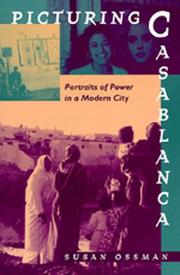| Listing 1 - 6 of 6 |
Sort by
|

ISBN: 0520914317 0585130035 9780520914315 9780585130033 0520084020 0520084039 9780520084032 Year: 1994 Publisher: Berkeley University of California Press
Abstract | Keywords | Export | Availability | Bookmark
 Loading...
Loading...Choose an application
- Reference Manager
- EndNote
- RefWorks (Direct export to RefWorks)
In Picturing Casablanca, Susan Ossman probes the shape and texture of mass images in Casablanca, from posters, films, and videotapes to elections, staged political spectacles, and changing rituals. In a fluid style that blends ethnographic narrative, cultural reportage, and the author's firsthand experiences, Ossman sketches a radically new vision of Casablanca as a place where social practices, traditions, and structures of power are in flux. Ossman guides the reader through the labyrinthine byways of the city, where state bureaucracy and state power, the media and its portrayal of the outside world, and people's everyday lives are all on view. She demonstrates how images not only reflect but inform and alter daily experience. In the Arab League Park, teenagers use fashion and flirting to attract potential mates, defying traditional rules of conduct. Wedding ceremonies are transformed by the ubiquitous video camera, which becomes the event's most important spectator. Political leaders are molded by the state's adept manipulation of visual media. From Madonna videos and the TV's transformation of social time, to changing gender roles and new ways of producing and disseminating information, the Morocco that Ossman reveals is a telling commentary on the consequences of colonial planning, the influence of modern media, and the rituals of power and representation enacted by the state.
History & Archaeology --- Regions & Countries - Africa --- Casablanca (Morocco) --- Civilization --- Civilization. --- Dār al-Bayḍāʼ (Morocco) --- Ḳasablanḳah (Mơrocco) --- Dar Albitsa (Morocco) --- Casablanca (Morocco) - Civilization --- Archaeology and history. --- Historical archaeology --- History and archaeology --- History
Book
ISBN: 080478552X 9780804785525 080477028X 9780804770286 0804770298 9780804770293 9780804770286 9780804770293 Year: 2013 Publisher: Stanford (Calif.) Stanford university press
Abstract | Keywords | Export | Availability | Bookmark
 Loading...
Loading...Choose an application
- Reference Manager
- EndNote
- RefWorks (Direct export to RefWorks)
Moving Matters is a richly nuanced portrait of the serial migrant: a person who has lived in several countries, calling each one at some point "home." The stories told here are both extraordinary and increasingly common. Serial migrants rarely travel freely—they must negotiate a world of territorial borders and legal restrictions—yet as they move from one country to another, they can use border-crossings as moments of self-clarification. They often become masters of settlement as they turn each country into a life chapter. Susan Ossman follows this diverse and growing population not only to understand how paths of serial movement produce certain ways of life, but also to illuminate an ongoing tension between global fluidity and the power of nation-states. Ultimately, her lyrical reflection on migration and social diversity offers an illustration of how taking mobility as a starting point fundamentally alters our understanding of subjectivity, politics, and social life.
Emigration and immigration --- Immigrants --- Cosmopolitanism. --- Political science --- Internationalism --- Emigrants --- Foreign-born population --- Foreign population --- Foreigners --- Migrants --- Persons --- Aliens --- Assimilation (Sociology) --- Social psychology --- Social aspects. --- Psychological aspects. --- Social life and customs. --- Cosmopolitanism --- #SBIB:39A6 --- Psychological aspects --- Social aspects --- Social life and customs --- Etniciteit / Migratiebeleid en -problemen

ISBN: 0739117092 0739158899 9780739158890 0739117084 9780739117088 9780739117095 Year: 2007 Publisher: Lanham Lexington
Abstract | Keywords | Export | Availability | Bookmark
 Loading...
Loading...Choose an application
- Reference Manager
- EndNote
- RefWorks (Direct export to RefWorks)
This book explores the relationship of mobility to subjectivity, identity to place by exploring the lives of people on the move. The authors draw on research among nomads, immigrants and serial migrants and question their own trajectories. Their comments on cosmopolitanism, ethnicity and religion challenge conventional wisdom from concrete but 'ungrounded' perspectives.
Transnationalism. --- Cosmopolitanism. --- Immigrants --- Assimilation (Sociology) --- Political science --- Internationalism --- Trans-nationalism --- Transnational migration --- International relations --- Cultural assimilation. --- Cosmopolitanism --- Transnationalism --- #SBIB:39A6 --- Cultural assimilation --- Etniciteit / Migratiebeleid en -problemen --- migratie --- transnationalisme

ISBN: 227105513X 9782271055132 Year: 1998 Volume: 22 Publisher: Paris CNRS
Abstract | Keywords | Export | Availability | Bookmark
 Loading...
Loading...Choose an application
- Reference Manager
- EndNote
- RefWorks (Direct export to RefWorks)
Philosophy and psychology of culture --- Aesthetics --- Mimesis --- Mimesis in art --- Mimesis in literature --- Mimésis --- Mimêsis --- Mimésis dans la littérature --- Mimésis --- Mimêsis --- Mimésis dans la littérature


ISBN: 2271055628 2271128293 9782271055620 Year: 2020 Publisher: Paris : CNRS Éditions,
Abstract | Keywords | Export | Availability | Bookmark
 Loading...
Loading...Choose an application
- Reference Manager
- EndNote
- RefWorks (Direct export to RefWorks)
Cet ouvrage analyse les rapports entre identité, médias et liens sociaux au Maghreb. Quels modes ou modèles de comportements – individuels ou collectifs – peuvent-être adoptés ? Qui peut les revendiquer ? Quels rôles jouent la nation et la religion dans l’adoption de telle ou telle pratique ? Comment parler de la tradition aujourd’hui… ? Ces questions traversent les présentes contributions, issues d’un travail collectif mené à l’Institut de recherche sur le Maghreb contemporain entre 1993 et 1996. Les thèmes traités – citons la presse dans le Tanger cosmopolite du début du siècle, la reconfiguration des liens familiaux par la télévision tunisienne au cours du ramadan, ou encore l’analyse des vêtements « islamiques » – offrent des réponses détaillées et nuancées à ces interrogations. Les lieux, par ailleurs, marquent leur importance, autant par leur histoire spécifique que comme vecteurs de sociabilité. Les liens qui s’y développent, à l’instar des vies qui s’y expriment, inscrivent ainsi des itinéraires où alternent mouvements et haltes. Qui sait mieux que les Maghrébins anciens d’Indochine la difficulté de situer leur mémoire ? Quelles trajectoires, imaginaires ou guidées, suivent le touriste ou le jeune écoutant du raï ? Si ces études sont résolument liées à l’espace social et géographique du Maghreb, elles rendent compte de l’imbrication complexe et mouvante de cet espace dans des « réseaux de référence » plus larges. Ces approches concrètes, menées dans des « lieux » variables, apportent une contribution aux débats actuels sur la globalisation et le rôle des médias.
Africa, North --- Civilization --- Afrique du Nord --- Civilisation --- Africa [North ] --- Social life and customs --- Social change --- Africa, North - Civilization - 20th century --- Library, Information & Communication sciences --- Sociology & Anthropology --- culture --- mondialisation --- Maghreb --- média --- dynamique sociale --- Barbary States --- Maghrib --- North Africa --- Caractère national --- Ethnicité --- Médias --- Médias et culture --- Maghrébins --- Identité ethnique --- Conditions sociales
Book

ISBN: 2821850484 Year: 2017 Publisher: Tunis : Institut de recherche sur le Maghreb contemporain,
Abstract | Keywords | Export | Availability | Bookmark
 Loading...
Loading...Choose an application
- Reference Manager
- EndNote
- RefWorks (Direct export to RefWorks)
Social Sciences, Interdisciplinary --- sciences sociales --- Tunisie --- urbanisation --- Afrique du Nord
| Listing 1 - 6 of 6 |
Sort by
|

 Search
Search Feedback
Feedback About UniCat
About UniCat  Help
Help News
News